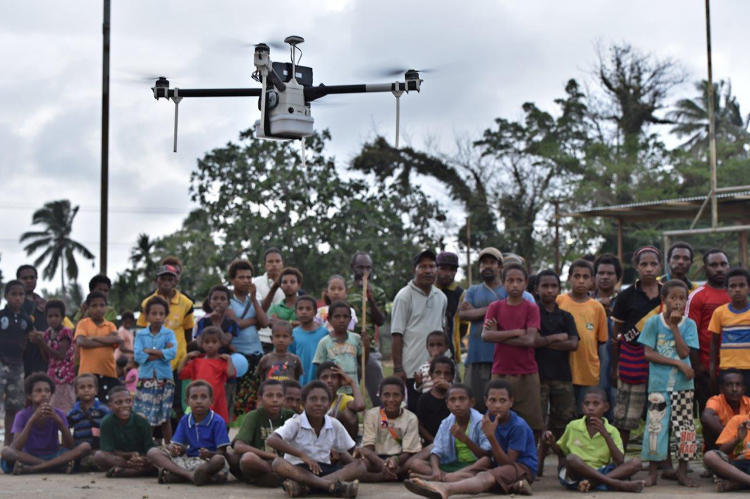WASHINGTON, DC | November 3, 2014 - This week on BIZ+SOCIAL, we bring you the best from the New Global Citizen, Fast Company, Devex, and more.
GLOBAL PRO BONO
Doctors Without Borders Is Experimenting With Delivery Drones To Battle An Epidemic
 It’s going to be a while before Amazon’s drones are delivering Christmas presents to anyone’s doorstep. But in the remote forests of Papua New Guinea, one startup’s vision for delivery drones is already coming to life. In September, executives of Matternet, a Silicon Valley drone startup, traveled to the Pacific Island nation at the invitation of the government and Doctors Without Borders staff, who are helping battle a serious tuberculosis epidemic in the rural regions of the country. “We’re working in one of the biggest swamps in the world,” says Doctors Without Borders (Médecins Sans Frontières, in French) program manager Eric Pujo. “It is a very challenging environment, and to run a good tuberculosis project, one of the key points is diagnostic. The earlier you can put a patient under treatment, the more likely you’ll stop it from spreading,” he says. The trouble for the doctors is transporting patients’ samples, which need to be analyzed quickly for an accurate diagnosis. In the Kerema district, the samples must travel from clinics to a central hospital that is anywhere from 15 to 85 miles away. Roads are either barely passable due to the mud or don’t exist at all. Planes, boats, and walking make for an unpredictable journey that can take a few hours or a few days. Pujo, who had heard a presentation given by Matternet CEO Andreas Raptopoulos, got in touch with the company when he realized that low-cost drones could be an ideal alternative. Read More…
It’s going to be a while before Amazon’s drones are delivering Christmas presents to anyone’s doorstep. But in the remote forests of Papua New Guinea, one startup’s vision for delivery drones is already coming to life. In September, executives of Matternet, a Silicon Valley drone startup, traveled to the Pacific Island nation at the invitation of the government and Doctors Without Borders staff, who are helping battle a serious tuberculosis epidemic in the rural regions of the country. “We’re working in one of the biggest swamps in the world,” says Doctors Without Borders (Médecins Sans Frontières, in French) program manager Eric Pujo. “It is a very challenging environment, and to run a good tuberculosis project, one of the key points is diagnostic. The earlier you can put a patient under treatment, the more likely you’ll stop it from spreading,” he says. The trouble for the doctors is transporting patients’ samples, which need to be analyzed quickly for an accurate diagnosis. In the Kerema district, the samples must travel from clinics to a central hospital that is anywhere from 15 to 85 miles away. Roads are either barely passable due to the mud or don’t exist at all. Planes, boats, and walking make for an unpredictable journey that can take a few hours or a few days. Pujo, who had heard a presentation given by Matternet CEO Andreas Raptopoulos, got in touch with the company when he realized that low-cost drones could be an ideal alternative. Read More…
IMPACT & INNOVATION
Commit!Forum Encourages the Need for Authentic Partnership for Social Change
“Partnership” is to relationships what “vanilla” is to ice cream. It has been so overused, in many cases with no real definition. A previously useful word has fallen prey to what some might call “the jargon curse.” Much too often the term partnership is deployed in support of a relationship that does not reflect the true intent behind the definition: “A relationship between individuals or groups that is characterized by mutual cooperation and responsibility, as for the achievement of a specified goal.” The key to “partnerships” is mutuality—mutual respect, mutual responsibility, mutual accountability, for a shared goal. Too often, however, relationships that are actually hierarchical—vendor-supplier or donor-beneficiary—are labeled “partnerships,” without the authentic engagement that recognizes the expertise and capabilities of both organizations to make the whole greater than the sum of its parts. At PYXERA Global, where authentic partnership is at the organization’s very core, the apparent trivialization through jargon has been a concern. It was a real pleasure, then, to join a panel at the Commit!Forum in New York City, with Deborah Holmes from EY and Gina Tesla from IBM, to speak about the changing nature of partnerships and how they can evolve from a management construct to a more active, on-going approach to engagement. Read more…
LEADERSHIP
Three Lessons From This Year’s Celebration of the Millennium Development Goals
Who doesn’t love a victory lap? This fall, during the third week of September, the who’s who of international development gathered in New York to extol all the good that has been done for the world in the past year. This year, the celebration was especially jubilant, as it marked the achievements of the past 15 years of work towards the Millennium Development Goals—the infamous MDGs. The Social Good Summit kicked off the week with panels and short talks design to inspire a global dialogue on #2030NOW, the Clinton Global Initiative convened the ultra-influential in its usual style, and the UN General Assembly provided an opportunity for national leaders of all stripes to celebrate their country’s progress towards meeting their individual goals. The victory lap commenced, and it was glorious. Amidst all the celebration, it’s sometimes hard not to be cynical. Certainly those who gather have the best intentions, and many individuals and organizations have indeed worked hard to improve lives. At the same time, the parade of dinners and receptions at some of New York’s finest venues contrasts starkly with the endless discussions of extreme poverty and inequality. In past years, my cynicism has quickly turned to optimism as I glimpsed the many innovations underway that have the ability to eliminate the world’s most egregious social challenges. Read More…
ENTERPRISE DEVELOPMENT
5 Sub-Saharan African Countries Among Most Improved to Do Business
 While Singapore, New Zealand, Hong Kong, Denmark and South Korea are again the top five countries in the world to do business, developing countries are catching up. Eighty percent of the countries the World Bank studied for its annual Doing Business report — with all income groups represented — showed improvements in their business regulations last year, but only a third moved up in their rankings. “As you move up the ranks, it becomes increasingly difficult to make improvements,” said Augusto Lopez-Claros, director of global indicators and analysis at the World Bank, noting the importance of strengthening other areas, such as education, in improving the business environment. Despite being home to some of the world’s poorest countries and most cumbersome business regulations, five sub-Saharan African countries are among the 10 with the most improvements from 2013 to 2014: Benin, the Democratic Republic of the Congo, the Ivory Coast, Senegal and Togo. More than 70 percent of economies in sub-Saharan Africa carried out at least one regulatory reform over the past year. In addition, the region saw 39 reforms reducing both the cost and complexity of regulatory procedures and 36 reforms strengthening legal institutions. Read more…
While Singapore, New Zealand, Hong Kong, Denmark and South Korea are again the top five countries in the world to do business, developing countries are catching up. Eighty percent of the countries the World Bank studied for its annual Doing Business report — with all income groups represented — showed improvements in their business regulations last year, but only a third moved up in their rankings. “As you move up the ranks, it becomes increasingly difficult to make improvements,” said Augusto Lopez-Claros, director of global indicators and analysis at the World Bank, noting the importance of strengthening other areas, such as education, in improving the business environment. Despite being home to some of the world’s poorest countries and most cumbersome business regulations, five sub-Saharan African countries are among the 10 with the most improvements from 2013 to 2014: Benin, the Democratic Republic of the Congo, the Ivory Coast, Senegal and Togo. More than 70 percent of economies in sub-Saharan Africa carried out at least one regulatory reform over the past year. In addition, the region saw 39 reforms reducing both the cost and complexity of regulatory procedures and 36 reforms strengthening legal institutions. Read more…
CITIZEN DIPLOMACY
Citizen Exchange Overcomes Tense Bilateral Relations to Foster Peace
In 2012, Xi Jingping, then Vice President of China, paid a return visit to the small town of Muscatine, Iowa. Xi reflected on his earlier visit, observing: “You were the first group of Americans I came into contact with. To me, you are America.” With these words to “old friends,” Xi marked his return to the community that had warmly welcomed him over a quarter century before. In 1985, while a young bureaucrat from Iowa’s sister state, Hebei Province, Xi experienced a visit so personally meaningful that, 27 years later, he insisted on a return visit and a private reunion with the score of Muscatine residents to whom he had been closest. Xi’s reaction illustrates the power of citizen diplomacy, and the seriousness of the work entrusted to citizen diplomats, as do the reflections of his former Muscatine homestay hostess, Eleanor Dvorchak. She greeted Xi, in 2012, by recalling: “You were my first introduction to the Chinese people…. So many times you hear so much bad in the news. And after having met you, it was all washed away.” As Xi’s and Dvorchak’s observations underscore, citizen diplomats are their country for those with whom they connect. Thanks to his homestay experience, Xi Jingping, now the President of the People’s Republic of China, has a uniquely rich notion of the American people. Read More…
MORE
Symantec Pledges to Engage 1M Students in STEM by 2020
What Does Corporate Social Responsibility Mean for the Technology Sector?
Get Buy-in for Your Global Strategy with Local Partners
How Good Management Contained Nigeria’s Ebola Crisis
New Global Citizen
The New Global Citizen chronicles the stories, strategies, and impact of innovative leadership and international engagement around the world. This is the world of the new global citizen. This is your world.




